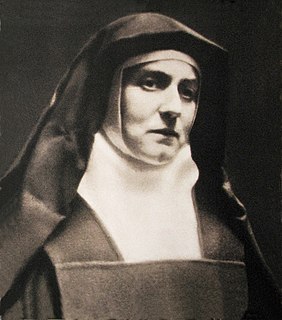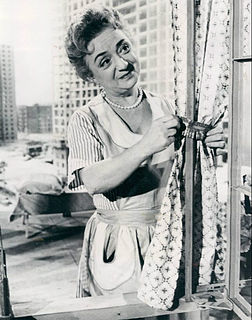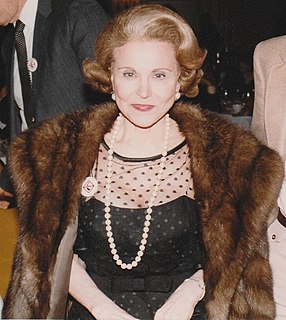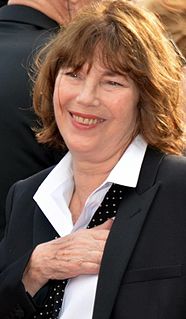A Quote by Edith Stein
Peoplehood tends to develop into nationhood if the people achieves a certain maturity. This is analogous to an individual person who becomes acquainted with herself only in the course of her life, without being able to say that she possessed no personal uniqueness at all before that 'self-recognition.'
Related Quotes
She emptied herself of Fabio and of herself, of all the useless efforts she had made to get where she was and find nothing there. With detached curiosity she observed the rebirth of her weaknesses, her obsessions. This time she would let them decide, since she hadn't been able to do anything anyway. Against certain parts of yourself you remain powerless, she said to herself, as she regressed pleasurably to the time when she was a girl.
A part of a healthy conscience is being able to confront consciencelessness. When you teach your daughter, explicitly or by passive rejection, that she must ignore her outrage, that she must be kind and accepting to the point of not defending herself or other people, that she must not rock the boat for any reason, you are NOT strengthening her posocial sense, you are damaging it-and the first person she will stop protecting is herself.
My grandmother had a picture of herself as a close-lipped, silent, reserved individual without curiosity, who never asked personal questions. Actually, of course, she was a talkative, jolly, interminably curious woman, who loved people, and who enjoyed the personal details of their lives almost as much as they did themselves.
It seemed to Alabama that, reaching her goal, she would drive the devils that had driven her - that, in proving herself, she would achieve that peace which she imagined went only in surety of one’s self - that she would be able, through the medium of the dance, to command her emotions, to summon love or pity or happiness at will, having provided a channel through which they might flow. She drove herself mercilessly, and the summer dragged on.
In fact her maturity and blood kinship converted her passion to fever, so it was more affliction than affection. It literally knocked her down at night, and raised her up in the morning, for when she dragged herself off to bed, having spent another day without his presence, her heart beat like a gloved fist against her ribs. And in the morning, long before she was fully awake, she felt a longing so bitter and tight it yanked her out of a sleep swept clean of dreams.
All along — not only since she left, but for a decade before — I had been imagining her without listening, without knowing that she made as a poor a window as I did. And so I could not imagine her as a person who could feel fear, who could feel isolated in a roomful of people, who could be shy about her record collection because it was too personal to share. Someone who might have read travel books to escape having to live in the town that so many people escape to. Someone who — because no one thought she was a person — had no one to really talk to.
The strongest reason why we ask for woman a voice in the government under which she lives; in the religion she is asked to believe; equality in social life, where she is the chief factor; a place in the trades and professions, where she may earn her bread, is because of her birthright to self-sovereignty; because, as an individual, she must rely on herself.
Maturity is the ability to control anger and settle differences without violence or destruction. The mature person can face unpleasantness, frustration, discomfort and defeat without collapsing or complaining. He/she knows he cannot have everything his/her own way every time. He/she is able to defer to circumstances, to other people-and to time. He/she knows when to compromise and is not too proud to do so.
Because no, I didn’t push her away. I didn’t add to her pain or do anything to hurt her. Instead, I left her alone in that room. The only person who might’ve been able to reach out and save her from herself. To pull her back from wherever she was heading. I did what she asked and I left. When I should have stayed.
When my father died, my mother came back from being Mrs. Birkin to being Judy Campbell. She was a stunning actress. She came out of her shell. She was herself again: this very independent, funny, intellectual lady - and was able to perform again, which was her life before meeting my father squashed it out.
Act without doing; work without effort. Think of the small as large and the few as many. Confront the difficult while it is still easy; accomplish the great task by a series of small acts. The Master never reaches for the great; thus she achieves greatness. When she runs into a difficulty, she stops and gives herself to it. She doesn't cling to her own comfort; thus problems are no problem for her.











































